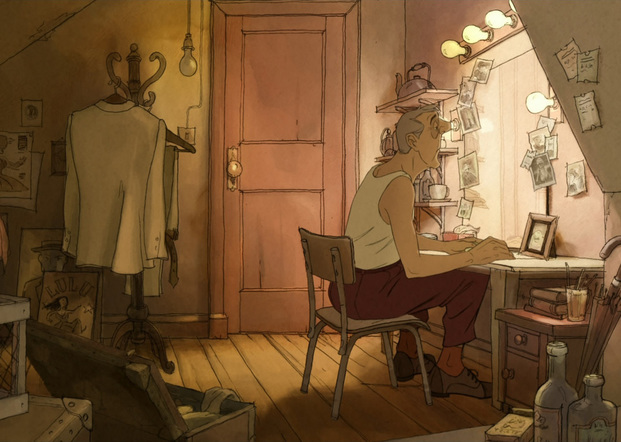|
THE ILLUSIONIST is a beautiful animation that will appeal to anyone who has ever felt lonely, misunderstood, or like an outsider. The screenplay was written in 1956 by French director and comedian Jacques Tati, whose films always placed a naïve, goofy but warm character in the middle of a mostly close-minded, monotonous society. THE ILLUSIONIST is no exception, but it will leave you melancholic instead of amused, as the protagonist, the eponymous “Illusionist” (Jean-Claude Donda), abandons his talent and passion because he is not accepted by society. Near the film’s end, the words “Magicians do not exist”, written by the Illusionist, show this lovable character is void of any hope and love for his art that he might have initially felt.
The film begins with a magician who cannot find an audience for his shows and so he moves to Scotland. There he encounters people who are amazed by his talent, mostly drunk men and women, but also a girl named Alice (Eilidh Rankin) whom he indirectly adopts. Their relationship presents the Illusionist as a selfless person with a good heart who just wants to make people happy with his art. Indeed, a character that resembles Jacques Tati. His eventual fate is much more saddening than Tati might have envisioned when he wrote it. Tati, who believed that filmmakers should have complete control over their films instead of being just another cog in the machine, creates a character that for a small moment in the film does exactly the opposite: he starts selling products in the window of a shop to earn more money. In the process, he cannot help but ignore Alice who quickly grows up and finds love. He chooses to leave Alice with her new boyfriend ending up more alone than he ever was, with no audience for his magic and having just lost his only friend. He consequently gives up being a magician. What makes this such a sad story is that it is an everyday situation in our society. Whenever someone tries to be or do something different, the person can very easily feel isolated because society does not fully accept it. Not only does it show the loneliness of artists as outsiders, but it also speaks to the fear of ending up like the Illusionist or the other artistic characters in the film, such as a puppeteer who is forced to sell his puppet and beg in the street when he cannot find work. A clear message in the film is that society has forgotten the magic in life. Instead, society is focused on mass production and industry, creating a sad, lifeless, grey world. On one dark and rainy day, everyone carries black umbrellas apart from Alice, who only has her white coat to protect herself. This dark imagery represents our current society and we cannot help but feel melancholic: we understand that that lonely magician could be, and is, us. More short reads about SADNESS >>> |


